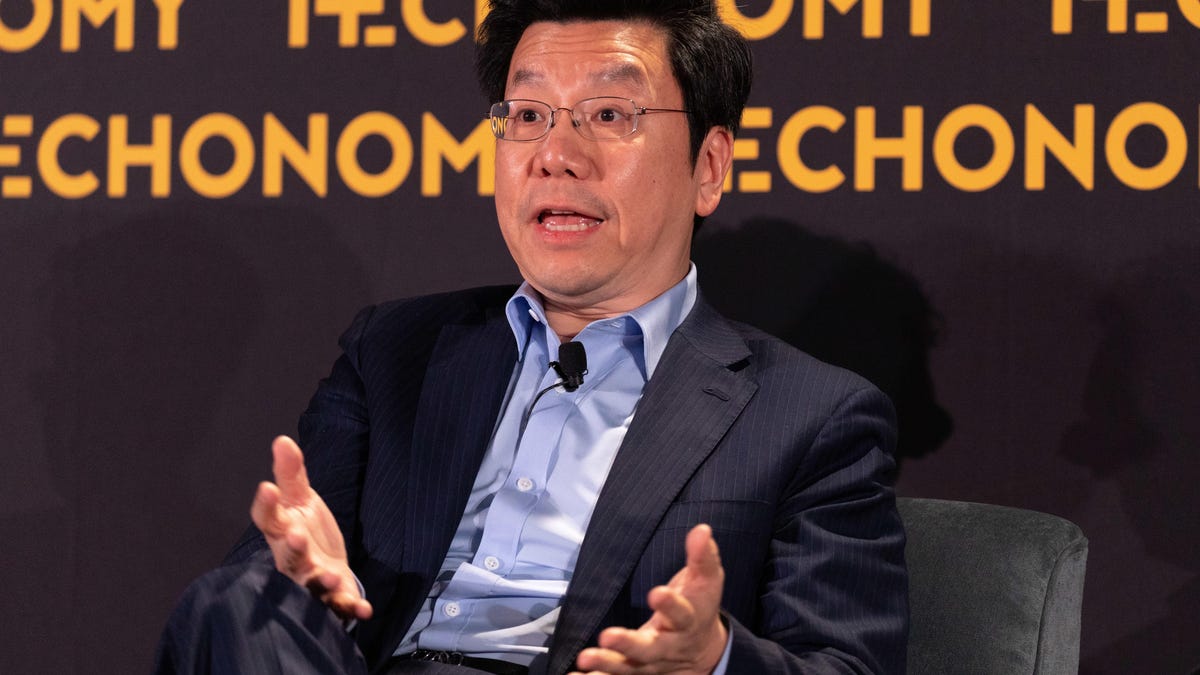To prepare for the AI revolution, learn to be more human
AI will displace many workers, says tech exec and investor Kai-Fu Lee. But it's got limits.

Sinovation Ventures CEO Kai-Fu Lee speaks at Techonomy 2018.
If you want a job in the 21st century, look for one that requires a human touch that even a computer boosted by artificial intelligence can't handle.
That's the advice of Kai-Fu Lee, chief executive of Beijing-based Sinovation Ventures and a former top executive at Google and Microsoft. He offered the guidance at at the Techonomy 2018 conference.
"AI cannot be creative. It cannot be strategic or [use] common sense," Lee said. "It can't be compassionate."
AI tools will help creative people be more creative and strategic people be more strategic, so core people can actually be more human, Lee said. "Jobs like doctors will require more EQ [emotional intelligence], more compassion, more human-to-human interaction, while AI takes over more the analytical, diagnostic work."
It's a provocative perspective for an executive steeped in the tech world. AI is a revolution touching just about every part of the tech that's deeply embedded in our lives. But Lee sees it as fundamentally limited, which is far from the fears of some influential thinkers like Kent Bostrom, the author of Superintelligence.
Even though Lee sees jobs for humans, he also sees plenty of disruption. His firm has invested in 45 startups, seven of them involved in AI, and most of them looking at technology that will replace human jobs such as telemarketer, customer service representative, loan officer, fruit picker and dishwasher.
Accenture CTO Paul Daugherty speaks at Techonomy 2018.
"For most companies, reskilling won't be possible. The type of skills may be too hard to retrain," said Lee author of the new book "AI Superpowers."
The disruption will hit white-collar jobs first and then blue-collar jobs, he said. "Anyone whose work is routine and has not much human-to-human interaction, those jobs are prone to be totally displaced."
AI helping humans
AI will change more jobs than it destroys, said Paul Daugherty, chief technology officer of consulting firm Accenture and author of "Human + Machine," also speaking at the conference.
"We see AI changing 90 percent of the work people do," Daugherty said. "Fifteen percent of jobs will be completely automated and replaced. But the major of jobs will be improved."
One example: the operator of an oil well drill will get direct physical feedback on things like tensile resistance and torque allowing him or her to decide where to steer the drill. Currently, drill operators rely on instructions from higher-ups.
With AI, "we're pushing decisions to the edge of the organization rather than eliminating the frontline jobs," Daugherty said.
Slow to adapt
It sounds optimistic, but companies are woefully behind in actually trying to adapt, he said.
It's no surprise that some employers aren't investing in retraining or otherwise trying to adapt gracefully. After all, shareholders want stock prices to go up, and laying off unneeded employees cuts expenses.
Paula Goldman, leader of the Tech and Society Solutions Lab at the Omidyar Network, speaks at Techonomy 2018.
But that might change as companies grapple with AI because of pressure on the board. Fiduciary responsibility has pushed companies to address their effect on climate change, and AI could bring similar scrutiny.
"There is a lot of a counterweight of investors who really care about this stuff," said Paula Goldman, leader of the Tech and Society Solutions Lab at the Omidyar Network, citing the potential for indices that track how well companies follow best practices. "You can reframe [AI response] as a business risk."

